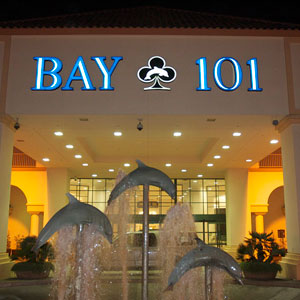A paper trail suggests that money from Bay 101, the San Jose card club, made its way to the campaign of City Council candidate Xavier Campos. Public records show that following the card club’s $50,000 contribution in support of a ballot measure, funds were transferred to Campos-aligned organizations that subsequently funded Campos’ bitter battle for a District 5 council seat, in apparent violation of city campaign laws.
Mayor Chuck Reed, incoming District Attorney Jeff Rosen and other local elected officials say the series of so-called “independent expenditures,” including a $3,994 contribution from the South Bay Labor Council to the Campos campaign, looks suspicious and may point to political corruption.
The money in question changed hands several times. Records at the city, county and state show that in late April, Bay 101 contributed $557,905 to the Committee to Help Preserve San Jose City Services, the group behind Measure K. That ballot measure, which passed on June 8, allowed San Jose card clubs to expand in exchange for increased taxes earmarked for city services.
The half-million-dollar contribution and others from Bay 101 essentially funded the entire campaign.
On May 5, the Measure K committee gave $50,000 to the South Bay AFL-CIO Labor Council’s Committee on Political Education.
Throughout April and May, that committee made numerous donations to candidates for city council and the state assembly. These included $3,994.15 to Xavier Campos, who is running to replace his sister, Nora Campos, on the San Jose City Council. The SBLC committee also spent $11,082.47 in independent expenditures against Xavier Campos’ opponent, Magdalena Carrasco.
If the money from the card room in fact was diverted into the Campos campaign, that would violate a San Jose ordinance designed to keep money from the city’s gaming establishments out of local elections. Ordinance 12.06.260 states that a card room “may not make any contribution to candidates or candidate-controlled committees.”
Matt Savage of Bay 101 was unavailable for comment at press time. SBLC Executive officer Cindy Chavez refused to comment. SBLC attorney Bianca Pirayou sent an email confirming that the organization received money from the Measure K committee and added that “all contributions to and expenditures by the South Bay Labor Council are legal and appropriate.”
Xavier Campos also declined to comment. His campaign manager, Adán Lupercio, issued a statement dismissing “the Chamber’s latest manufactured conspiracy,” with no further explanation.
Enforcement of city election laws falls on the Government Integrity Unit of the Santa Clara County District Attorney’s office. That office, which enjoyed a quiet period under defeated outgoing District Attorney Dolores Carr, is currently a one-person operation, run by Deputy DA Merle “Bud” Frank.
Asked about the card room money in the local race, Frank dismissed the evidence and refused to comment further.
But District Attorney-elect Jeff Rosen, who during his campaign charged that Carr had not been sufficiently aggressive in government integrity cases, promised to look into the matter when he takes office.
“This goes to the core of what people expect in the DA,” Rosen said Monday. “I will take steps to delve into this and familiarize myself with this case on Jan. 3.”
{pagebreak}
District 3 Councilman Sam Liccardo also chastised the current DA’s office for not looking into the matter.
“I have no problem saying that this District Attorney has neglected to pursue any serious political corruption case before her, and in some instances has dropped those cases completely,” Liccardo said.
“I know nothing about the internal machinations of the South Bay Labor Council or how money moves within the organization, but the fact that these footprints are in the snow leads me to have serious concerns. And they should lead an independent district attorney to have similar concerns. I look forward to a fuller investigation.”
Mayor Chuck Reed, who endorsed Carr, says that he sees a profound lack of oversight in this case. He says the San Jose Elections Commission, California Fair Political Practices Commission and State Legislature have failed to enforce government integrity laws for too long.
“They have a relationship there that allows money to move between entities pretty freely,” Reed said. “And, in two or three moves, you can end up influencing candidate races, either directly or indirectly through direct contributions or coordination. So, what you’re seeing here may only be part of the money that was moved.”
Reed says he raised the issues of independent expenditures when he campaigned in the 2006 mayoral race against Cindy Chavez, now head of the South Bay Labor Council.
“I have some past experience with trying to follow the money, and these folks have been pretty good about not making it easy to follow,” Reed said. “My guess is that this is only part of the money.”
Chavez and the South Bay Labor Council were strong supporters of Measure K and pushed hard to place the proposition on the ballot. But when the matter came down to the vote, only one labor-aligned councilmember—Nancy Pyle—voted to support the
{pagebreak}
measure. The rest of the labor bloc—Ash Kalra, Nora Campos, Kansen Chu and Madison Nguyen—after lauding the proposition from the dais, voted no. But that didn’t matter—the measure passed 6-5.
Money Handler Tells All
There is another reason many City Hall watchers find it easy to believe that Bay 101 indeed used SBLC and its political ecosystem to disguise the fact that it was distributing money to local candidates. An SBLC-friendly political consultant laid out the strategy in a news article earlier in the summer.
Following the June 8 election, political consultant Ed McGovern admitted—or bragged—that SBLC used money from a client of his to produce a hit piece on a mutual opponent.
The money originated with DMB Associates, the developer behind the huge Cargill Saltworks project in Redwood City. McGovern told the Palo Alto Daily News that DMB paid SBLC $30,000 to produce a mailer attacking Assembly candidate Yoriko Kishimoto, who opposed the development.
“It was my idea and I told the folks at DMB we should do it and we went to labor,” McGovern said.
DMB paid for polling research and determined that Kishimoto’s opposition to high-speed rail and extending BART to San Jose “were clearly the most troublesome for her with the voters,” McGovern said.
SBLC’s Committee on Political Education, the same body that took $50,000 from Measure K/Bay 101, then produced a mailer with a photo of a congested freeway and the message: “Stuck in traffic again? Thank Yoriko Kishimoto. She campaigned to keep you there!”
There was no mention of the Cargill development—or of DMB. The fine print on the bottom credited only SBLC.
“This is our message,” McGovern says in the July 9 story. “Elected officials certainly have the right to take sides…but we also have the right to express our opposition of those elected officials, and we did with Kishimoto, and we’re very happy she was defeated. We’re going to continue to look for opportunities in November to do the same thing.”
Mayor Reed, who vowed in his “Reed Reforms” to “plug loopholes in campaign financing,” says that he’s looking to Rosen to finally start coming down hard on government integrity cases.
“I think Jeff Rosen is our only hope,” Reed said. “I would certainly like to change the cozy relationship among these different entities that allows this money to move freely and makes it difficult to track.”
“If Jeff Rosen takes a hard line on some of these things, that would perhaps make up for some of the loose interpretations that have then been stretched beyond anything reasonable.”

 New Clinic Planned at Medical Center Site
New Clinic Planned at Medical Center Site 


